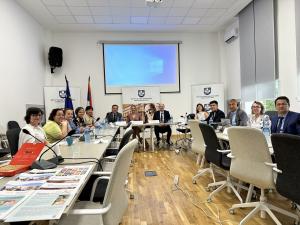Central Asian countries are actively working towards improving access to water and sanitation. Despite recent progress, Kazakhstan's aging infrastructure, lack of human resources and financial constraints still limit the access of rural population to improved water and sanitation services. In 2022, 10% of the rural population did not have regular access to water. In Uzbekistan, the share of the population with access to a centralized water supply system has increased from 66.6% in 2005 to 69.6% in 2022, while 30.3% of the population, mostly rural, relies on alternative water sources, such as water wells, bottled water, rainwater, etc., and 0.1% of the population depends on imported water. Therefore, both countries have a clear focus on the development of sectoral institutions, policy improvements, and the implementation of measures aimed at reducing environmental impact and strengthening water disease prevention and control programs. In this context, the UNECE-WHO/Europe Protocol on Water and Health offers a powerful legal framework and a wealth of practical tools to take action in addressing these challenges.
To support these efforts, Kazakhstan and Uzbekistan affirmed their commitment to accede to the Protocol on Water and Health at a subregional workshop hosted by the Government of Serbia in Belgrade on 26-27 June 2023.
The representative of Kazakhstan updated on the latest status of accession: “The process of accession to the Protocol on Water and Health is now undergoing an interministerial consultation led by the Ministry of Health. Accession to the Protocol is expected to be successfully completed by 31 December 2024.”
The representative of Uzbekistan stated that: “The draft Presidential Decree on accession has been submitted to the Ministry of Justice, which is one of the final steps of the process.”
At the workshop, participants could benefit from the extensive experience of Serbia, former Chair of the Bureau of the Protocol and currently a Bureau member. As highlighted by the Serbian Assistant Minister of Health, Dr. Jelena Jankovic: “Serbia is glad to present the work and results achieved under the Protocol on Water and Health. Since the ratification of the Protocol in 2013, we have implemented a wide and integrative approach in water, sanitation, hygiene and health areas by using Protocol tools. We are here to share our knowledge and experience in these areas and to learn from the experience of Central Asian countries.”
The Protocol on Water and Heath facilitates cooperation between different authorities responsible for water and health and helps to identify gaps in policy and legislation. It also supports countries to jointly find solutions at national and local levels, and facilitates the scaling up of successful practices at the pan-European level.
The workshop, organized by UNECE, with support of WHO/Europe, and hosted by the Institute of Public Health of Serbia, is expected to give a boost to the finalization of the accession processes in Kazakhstan and Uzbekistan and to stimulate progress in Tajikistan. It was also a milestone in interregional cooperation between Central Asian countries and Serbia at both policy and technical levels.
Participants visited the largest Belgrade water treatment unit, “Makis”. The plant, which helps provide clean drinking water to the growing population of Belgrade, is designed to process and treat raw water from the Sava River. Participants from Kazakhstan and Uzbekistan exchanged views with Serbian authorities on the procedures for water treatment, monitoring water quality through regular sampling and analysis, and witnessed firsthand the 5 main treatment stages used at the plant, e.g. coagulation, flocculation, sedimentation, filtration and disinfection.
Ms. Sarangoo Radnaaragchaa, UNECE Regional Advisor on Environment, stated: “Water management issues, water supply, wastewater, hygiene, sanitation and health are all priority areas for Central Asian countries, which has been repeatedly confirmed by statements at the highest level. In this regard, UNECE provides technical support to countries in the ratification and implementation of legal instruments, norms and standards, such as the Protocol on Water and Health, as well as other UNECE instruments”.
For more information about the event, including presentations by Member States, and the report, please see https://unece.org/environmental-policy/events/supporting-accession-unece-whoeurope-protocol-water-and-health-exchange.


